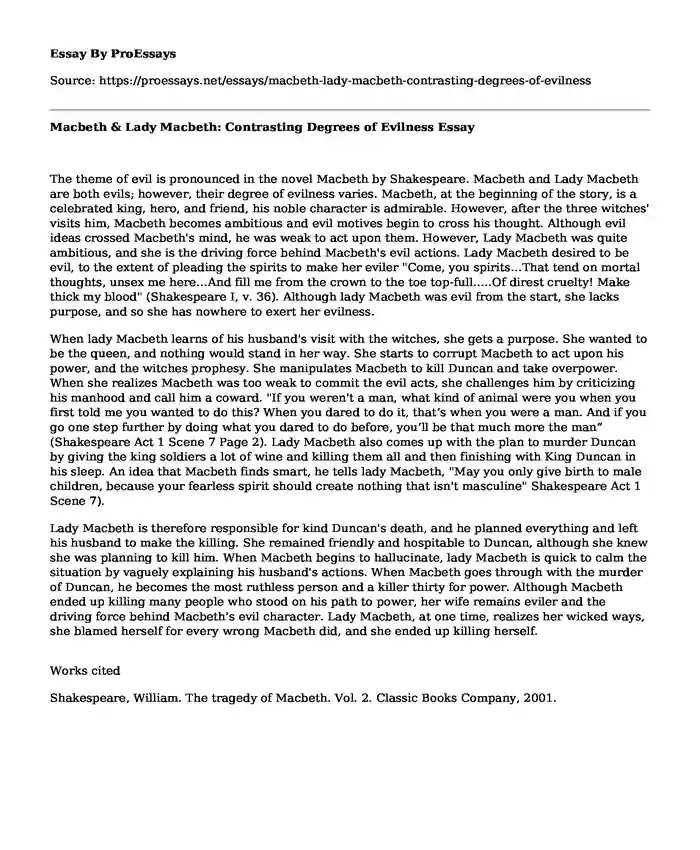The theme of evil is pronounced in the novel Macbeth by Shakespeare. Macbeth and Lady Macbeth are both evils; however, their degree of evilness varies. Macbeth, at the beginning of the story, is a celebrated king, hero, and friend, his noble character is admirable. However, after the three witches' visits him, Macbeth becomes ambitious and evil motives begin to cross his thought. Although evil ideas crossed Macbeth's mind, he was weak to act upon them. However, Lady Macbeth was quite ambitious, and she is the driving force behind Macbeth's evil actions. Lady Macbeth desired to be evil, to the extent of pleading the spirits to make her eviler "Come, you spirits...That tend on mortal thoughts, unsex me here...And fill me from the crown to the toe top-full.....Of direst cruelty! Make thick my blood" (Shakespeare I, v. 36). Although lady Macbeth was evil from the start, she lacks purpose, and so she has nowhere to exert her evilness.
When lady Macbeth learns of his husband's visit with the witches, she gets a purpose. She wanted to be the queen, and nothing would stand in her way. She starts to corrupt Macbeth to act upon his power, and the witches prophesy. She manipulates Macbeth to kill Duncan and take overpower. When she realizes Macbeth was too weak to commit the evil acts, she challenges him by criticizing his manhood and call him a coward. "If you weren't a man, what kind of animal were you when you first told me you wanted to do this? When you dared to do it, that's when you were a man. And if you go one step further by doing what you dared to do before, you'll be that much more the man" (Shakespeare Act 1 Scene 7 Page 2). Lady Macbeth also comes up with the plan to murder Duncan by giving the king soldiers a lot of wine and killing them all and then finishing with King Duncan in his sleep. An idea that Macbeth finds smart, he tells lady Macbeth, "May you only give birth to male children, because your fearless spirit should create nothing that isn't masculine" Shakespeare Act 1 Scene 7).
Lady Macbeth is therefore responsible for kind Duncan's death, and he planned everything and left his husband to make the killing. She remained friendly and hospitable to Duncan, although she knew she was planning to kill him. When Macbeth begins to hallucinate, lady Macbeth is quick to calm the situation by vaguely explaining his husband's actions. When Macbeth goes through with the murder of Duncan, he becomes the most ruthless person and a killer thirty for power. Although Macbeth ended up killing many people who stood on his path to power, her wife remains eviler and the driving force behind Macbeth's evil character. Lady Macbeth, at one time, realizes her wicked ways, she blamed herself for every wrong Macbeth did, and she ended up killing herself.
Works cited
Shakespeare, William. The tragedy of Macbeth. Vol. 2. Classic Books Company, 2001.
Cite this page
Macbeth & Lady Macbeth: Contrasting Degrees of Evilness. (2023, Aug 16). Retrieved from https://proessays.net/essays/macbeth-lady-macbeth-contrasting-degrees-of-evilness
If you are the original author of this essay and no longer wish to have it published on the ProEssays website, please click below to request its removal:
- Knowledge Translation in Nursing
- Irony, Foreshadowing, and Symbolism in The Lottery
- PICOT Question and Its Significance in Nursing Practice Paper Example
- The Road Not Taken by Robert Frost and The Rose that Grew From Concrete by Tupac Shakur Essay
- Seizures: Types & Causes - Essay Sample
- Essay Example on Unlock Motivation: The Life of Robert Frost, Poet & Motivator
- Essay Example on Maternity & Pediatric Nursing Care: Family-Centric Care for Smooth Recovery







